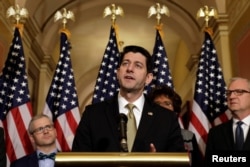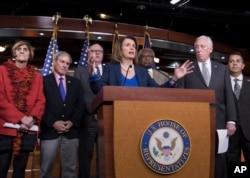U.S. government agencies prepared late Friday to halt non-essential operations hours before federal funding expires, as a partisan standoff paralyzed Congress’ ability to extend spending authority.
The Senate’s vote to end debate on the stopgap funding bill has failed to advance the measure. It is unclear what negotiations may be taking place behind the scenes to avert the midnight deadline.
Earlier in the day, a meeting between President Donald Trump and the Senate’s top Democrat failed to yield a breakthrough.
“We made some progress, but we still have a good number of disagreements,” Minority Leader Chuck Schumer said in a statement after departing the White House.
Unless a last-minute deal is struck, Schumer’s Democratic caucus is poised to block a Republican-crafted bill that would fund the federal government through mid-February. The House of Representatives approved the bill Thursday with nothing but Republican votes.
Senate Democrats are withholding support to press demands for congressional action on immigration and spending priorities, while insisting on an end to month-to-month government funding.
Republicans accused their Democratic colleagues of misplaced priorities.
“Millions of people, including our military, law enforcement and emergency personnel could lose their paycheck if Democrats follow through on their threat,” Senator John Cornyn of Texas said. “The time to stop playing games is now. We urge them [Democrats], we implore them: Do not shut down the government.”
"This vote should be a no-brainer, and it would be except the Democratic leader has convinced his members to filibuster [block] any funding bill that doesn't include legislation they are demanding for people who came into the United States illegally," Senate Majority Leader Mitch McConnell of Kentucky said on the Senate floor.
Trump and congressional Republicans repeatedly asserted that Democrats would be to blame if nonessential government operations came to a halt, a charge Democrats rejected.
"When you look across the spectrum of the three branches of government, the Republicans are in control," Senator Dick Durbin, a Democrat from Illinois, said.
Immigration reform
Democrats backed three previous short-term spending extensions late last year while bipartisan negotiations went forward on immigration and spending priorities. Last week, Trump rejected a bipartisan Senate immigration proposal, throwing congressional negotiations into disarray.
Democrats were demanding prompt congressional votes on an immigration reform package that would shield from deportation hundreds of thousands of undocumented immigrants brought to America as children. Republicans noted that the young immigrants would not face possible deportation until March, when the Deferred Action for Childhood Arrivals program, DACA, expires.
In a Friday morning tweet, Trump acknowledged that Democratic votes were needed to keep the government funded, but said that Democrats' demand for a DACA fix meant they favored illegal immigration to the United States, a charge Democrats denied.
The bipartisan Senate immigration deal Trump rejected would have boosted U.S. border security, including enhancing physical barriers along the U.S.-Mexico border, as the president has long demanded. The White House said the proposed measures did not go far enough.
As the clock ticked toward a partial government shutdown, finger-pointing became more prevalent on Capitol Hill.
The office of House Speaker Paul Ryan, a Wisconsin Republican, issued a statement accusing Democrats of "reckless intent" to shut down the government."
"Senate Democrats are the only ones standing in the way of a fully funded government and a reauthorized health insurance program for children. This is no time to play politics and force a shutdown," the statement said. "This is wrong. I urge Senator Schumer and the Senate Democrats to reconsider their reckless intent to shut down the government."
But House Democrats said they were united in an effort to negotiate with Republicans to prevent a shutdown.
"We knew we needed to be here and get the work done," Senator Steny Hoyer, a Maryland Democrat, told reporters Friday. "It is time to stop squandering the opportunity to come together and agree. We want to enact bipartisan agreement."
"We all agree the Dreamers [a common term for DACA beneficiaries] should remain in America, and to that extent we represent 87 percent of the American public," he said.
House members were told to remain "flexible" in case they were needed for a vote on an even shorter-term continuing resolution to keep the government open.
The U.S. government has shut down before. The last time was in 2013, in a deadlock over health care policy. The shutdown lasted 16 days and furloughed hundreds of thousands of federal workers.
What stops and what continues during a federal shutdown varies, but federal research projects could be stalled, tax refunds delayed, processing of veterans' disability applications delayed, and federal nutrition programs suspended, as was the case in 2013.
VOA's Katherine Gypson and Peter Heinlein contributed to this report.







